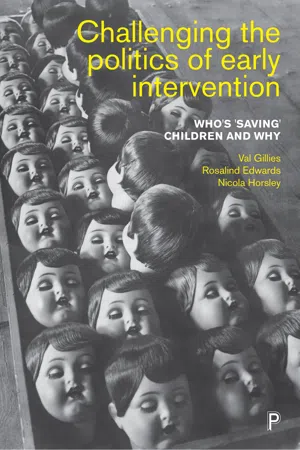![]()
References
All Party Parliamentary Group for Conception to Age Two (2015) Building great Britons, www.wavetrust.org/sites/default/files/reports/Building_Great_Britons_Report-APPG_Conception_to_Age_2-Wednesday_25th_February_2015.pdf
Allen, G. (2011a) Early intervention: The next steps. An independent report to Her Majesty’s Government, London: Cabinet Office.
Allen, G. (2011b) Early intervention: Smart investment, massive savings. Second Independent Report to Her Majesty’s Government, London: Cabinet Office.
Allen, G. and Duncan Smith, I. (2008) Early intervention: Good parents, great kids, better citizens, London: Centre for Social Justice and the Adam Smith Institute.
Anthias, F. (2013) ‘Intersectional what? Social divisions, intersectionality and levels of analysis’, Ethnicities, 13: 3–19.
Back, L. (2015) ‘On the side of the powerful: The “impact agenda” and sociology in public’, Sociological Review Blog, www.thesociologicalreview.com/blog/on-the-side-of-the-powerful-the-impact-agenda-sociology-in-public.html
Ball, S. (2010) ‘New voices, new knowledges and the new politics of education research: The gathering of a perfect storm?’, European Educational Research Journal, 9(2): 124–37.
Ball, S.J. (2015) ‘Subjectivity as a site of struggle: Refusing neoliberalism?’, British Journal of Sociology of Education, 37(8): 1129–1146. DOI: 10.1080/01425692.2015.1044072
Ball, S.J. and Junemann, C. (2012) Networks, new governance and education, Bristol: Policy Press.
Barn, R. (2013) ‘“Race” and adoption crusades in 21st-century Britain’, Huffington Post, www.huffingtonpost.co.uk/professor-ravinder-barn/race-and-adoption-michael-gove_b_2657383.html
Barnardo, T. (1885) Worse than orphans: How I stole two girls and fought for a boy, London: J.F. Shaw & Co.
Barnes, J., Ball, M., Meadows, P., McLeish, J., Belsky, J. and the FNP Implementation Research Team (2008) Nurse–Family Partnership programme: First year pilot sites implementation in England: Pregnancy and the post-partum period, London: Birkbeck College, http://dera.ioe.ac.uk/8581/1/dcsf-rw051%20v2.pdf.
Barnes, M. (2012) Care in everyday life: An ethic of care in practice, Bristol: Policy Press.
Bate, A. (2016) The Troubled Families programme (England), Briefing Paper CBP 07585, 9 August, London: House of Commons Library.
BBC News (2015) ‘Invest in the first 1001 days say experts’, 25 February, www.bbc.co.uk/news/education-31607711
Becker, G. (1981) Treatise on the family, Cambridge, MA: Harvard University Press.
Behlmer, G.K. (1998) Friends of the family: The English home and its guardians, 1850–1940, Stanford, CA: Stanford University Press.
Belfiore, E. (2009) ‘On bullshit in cultural policy practice and research: Notes from the British case’, International Journal of Cultural Policy, 15(3): 343–59.
Bellamy, C. (2000) The state of the world’s children 2001: Early childhood, UNICEF, www.unicef.org/sowc/archive/ENGLISH/The%20State%20of%20the%20World’s%20Children%202001.pdf
Bennett, C.M., Baird, A.A., Miller, M.B. and Wolford, G.L. (2009) ‘Neural correlates of interspecies perspective taking in the post-mortem Atlantic salmon: An argument for multiple comparisons correction’, Neuroimage, 47: S125, http://prefrontal.org/files/posters/Bennett-Salmon-2009.pdf
Beresford, P. (2016) All our welfare: Towards participatory social policy, Bristol: Policy Press.
Berlant, L. (2011) Cruel optimism, Durham NC: Duke University Press.
Bernier, A. and Meins, E. (2008) ‘A threshold approach to understanding the origins of attachment disorganization’, Developmental Psychology, 44(4): 969–82.
Bilson, A. and Martin, E.C. (2016) ‘Referrals and child protection in England: One in five children referred to children’s services and one in nineteen investigated before the age of five’, British Journal of Social Work. DOI: 10.1093/bjsw/bcw054
Bishop, M. and Green, M. (2008) Philanthrocapitalism: How the rich can save the world, London: Bloomsbury.
Blair, T. (2006) ‘Our nation’s future – social exclusion’, Speech, York, 5 September, http://webarchive.nationalarchives.gov.uk/20040105034004/http:/number10.gov.uk/page10037
Boddy, J., Smith, M. and Statham, J. (2011) ‘Understandings of efficacy: Cross-national perspectives on “what works” in supporting parents and families’, Ethics and Education, 6: 181–96.
Boucher, E. (2014) Empire’s children: Child emigration, welfare, and the decline of the British world, 1869–1967, Cambridge: Cambridge University Press.
Broad, W.J. (2014) ‘Billionaires with big ideas are privatizing American science’, New York Times, 16 March, www.nytimes.com/2014/03/16/science/billionaires-with-big-ideas-are-privatizing-american-science.html?_r=0
Brown, R. and Ward, H. (2013) Decision-making within a child’s timeframe: An overview of current research evidence for family justice professionals concerning child development and the impact of maltreatment, Working Paper 16, London: Childhood Wellbeing Research Centre.
Bruer, J.T. (1999) The myth of the first three years: A new understanding of early brain development and lifelong learning, New York: Simon and Schuster.
Button, K.S., Ioannidis, J.P.A., Mokrysz, C., Nosek, B.A., Flint, J., Robinson, E.S.J. and Munafo, M.R. (2013) ‘Power failure: Why small sample size undermines the reliability of neuroscience’, Nature Reviews Neuroscience, 14: 365–76.
Bywaters, P. (2015) ‘Inequalities in child welfare: Towards a new policy, research and action agenda’, British Journal of Social Work, 45(1): 6–23.
Bywaters, P., Brady, G., Sparks, T. and Bos, E. (2014) ‘Inequalities in child welfare intervention rates: The intersection of deprivation and identity’, Child and Family Social Work, 21(4): 452–463.
Bywaters, P., Bunting, L., Davidson, G., Hanratty, J., Mason, W. McCartan, C. and Stelis, N. (2016) The relationship between poverty, child abuse and neglect: An evidence review, JRF Report, York: Joseph Rowntree Foundation.
Cabinet Office (2006) Reaching out: An action plan on social exclusion, London: HM Government.
Cabinet Office (2014) What works? Evidence for decision makers, www.gov.uk/government/uploads/system/uploads/attachment_data/file/378038/What_works_evidence_for_decision_makers.pdf
Cartwright, N. (2007) ‘Are RCTs the gold standard?’, BioSocieties, 2(1): 11–20.
Chugani, H., Behen, M.E., Muzik, O., Juha, C., Nagy, F. and Chugani D. (2001) ‘Local brain functional activity following early deprivation: A study of postinstitutionalized Romanian orphans’, Neuroimage,14: 1290–301.
Chugani, H., Phelps, M.E. and Mazziota, J.C. (1987) ‘Positron emission tomography study of human brain function development’, Annals of Neurology, 22: 487–97.
Churchill, H. and Clarke, K. (2009) ‘Investing in parenting education: A critical review of policy and provision in England’, Social Policy and Society, 9(1): 39–53.
CIPD (Chartered Institute of Personnel and Development) (2015) ‘Over-qualification and skills mismatch in the graduate labour market’, www.cipd.co.uk/publicpolicy/policy-reports/overqualification-skills-mismatch-graduate-labour-market.aspx
Clark, C.L., St John, N., Pascam, A.M., Hyde, S.A., Hornbeak, K., Abramova, M., Feldman, H., Parker, K.J., Penn, A.A. (2013) ‘Neonatal CSF oxytocin levels are associated with parent report of infant soothability and sociability’, Psychoneuroendocrinology, 38(7): 1208–12.
Clayton, J. (2015) Breaking the cycle of deprivation, NCT Service Development and Policy, www.nct.org.uk/sites/default/files/related_documents/Clayton%20J%20Breaking%20the%20cycle%20of%20disadvantage.pdf
Coote, A. (2015) ‘People, planet, power: Towards a new social settlement’, The New Economics Foundation blog, http://neweconomics.org/2015/02/people-planet-power/?lost=true&_sf_s=%20publications%20%20%20%20%20planet%20power%20towards%20a%20new%20social%20settlement%3Fsource%3Dnew%20social%20settlement
Cottam H. (2011) ‘Relational welfare’, Soundings, https://www.lwbooks.co.uk/soundings/48/relational-welfare
Crone, E.A. and Ridderinkhof, K.R. (2011) ‘The developing brain: From theory to neuroimaging and back’, Developmental Cognitive Neuroscience, 1: 101–9.
Crossley, S. (2015) ‘The Troubled Families programme: The perfect social policy?’, Centre for Crime and Justice Studies Briefing Paper 13, www.crimeandjustice.org.uk/sites/crimeandjustice.org.uk/files/The%20Troubled%20Families%20Programme%2C%20Nov%202015.pdf
CSJ (Centre for Soc...
